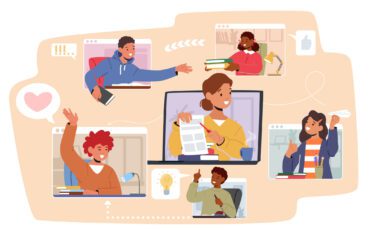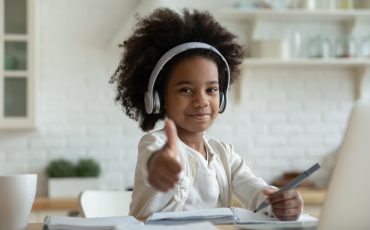Online Schools: A Virtual Reality
Now, more than ever before, families have options for schooling. The newest option (made familiar thanks to COVID) is virtual education and is most simply defined as the practice of teaching students remotely using computers.
Parents and students may choose virtual learning for a myriad of reasons. Some families want the scheduling flexibility that virtual options can provide, or parents may want to be more involved in their child’s education. Some children have been bullied at school, while others may have health needs or social anxiety.
To be successful with virtual education, students should have strong abilities in independence, responsibility, organization, self-discipline, communication, technology and handling challenges.
Table of Contents
What does virtual education look like in Georgia?
Virtual learning has a history in Georgia. Georgia Cyber Academy (GCA) serves more than 11,000 students across the state. “We have been around since 2007 and have been serving kids in grades K through 12 for all that time,” said Michael D. Kooi, the interim superintendent. “We’ve had a lot of opportunity to improve and make our product interactive and interesting for our kids.”
As a public school, GCA is tuition-free, and provides a computer to every student, as well as hot spots for low-income students. Enrollment opens in February. GCA’s teachers are Georgia Certified and specially trained in online learning. Georgia Connections Academy is another online public- school option that has been serving Georgia families for a decade.
Since the pandemic, many metro Atlanta school districts have embraced virtual learning. Atlanta Public Schools and Cobb County School District now offer virtual programs.
“Cobb Virtual Academy and Cobb Online Learning Academy give Cobb County parents flexibility for their children. Parents wanted options, and the superintendent took the initiative to develop those options,” said Ehsan Kattoula, the assistant superintendent for Cobb County School District. “We don’t want students to have a different experience based on where they’re learning. The students choose virtual, and the parents make the ultimate choice.”
Private schools are also starting to offer virtual options. For instance, The Mount Vernon School, a private school in Sandy Springs, will start allowing students to learn virtually with their upcoming Mount Vernon School Online program, which will open in August 2023 with a ninth-grade cohort. “The pandemic reinforced the need that all learners and families have for flexibility,” said Head of School Kristy Lundstrom. “Our program appeals to families that need more flexibility, but don’t want to sacrifice a quality educational experience. Flexibility of coursework being fully asynchronous affords students the ability to pursue passions. MVOnline curriculum is very similar to The Mount Vernon School, but in a digital format that students can take anywhere. We are able to adjust path, place and pace for the ultimate flexibility to meet students where they are.”
When the program starts, students will be able to take an MVOnline course in the summer before or during high school, and they can also take non-degree courses as a supplement. Applications are open for 2023-24 with a rolling admission process.
How do teachers connect with students?
In a virtual classroom, teachers need different skills, particularly regarding technology. GCA has an onboarding program for staff, with an orientation to meet experienced teachers and the IT team to be trained in the learning tools and platforms for curriculum. GCA also has supports and services available for families. “We want to make sure struggling students have what they need to succeed,” Kooi said. “We have family engagement liaisons who are dedicated to families and walk them through how the program works.”
Creating a connection is important for teachers and staff. “All of us believed in having a good hands-on learning experience for the students in the way they wanted to learn,” Kattoula said. “We want to have the students complete courses and be able to earn a grade and to be successful. Our teachers have high skills in delivering virtual learning, and they’re expected to be able to present information in a way for students to learn and be successful.”
To launch their new program, Mount Vernon researched and looked at different programs. “Our main question was, ‘How might we develop a program that is asynchronous but also highly relational?’ We wanted to bring elements of what we know learners need – flexibility and meaningful connections,” Lundstrom said. “Our faculty participates in world-class professional development, in addition to ongoing, embedded training with Instructional Coaches and are also supported by an Ed-tech team.”
Carey Bayer’s 16-year-old daughter attends Cobb Online Learning Academy. Bayer has found her connection with teachers to be even more meaningful than it was in an in-person setting. “She gets the opportunity to learn with teachers who teach in a different way. They run things like a collegiate-style school with set time in class and set office hours. These teachers really care about her. She was inducted into Beta Club recently, and it was her first time meeting the teachers in-person, but they were very connected. She’s a scholar-athlete, as an equestrian, and they asked her about her horses, about her service activities. They are connected and supportive of not just her academics.”
Why do families choose virtual learning?
Originally, the Bayer family was interested in virtual education due to the pandemic, but now, they plan to attend the school until graduation. Bayer loves the confidence her daughter has cultivated at
COLA. “I like that she is in an environment where she is thriving. She loves the flexibility, and she’s learning a lot more, as she’s not having to deal with some of the social distractions present in in-person learning. With COLA, she’s been able to be in leadership positions and build clubs in the school. She helped co-found the student newsletter, and she’s part of the student advisory council.”
Shannon Tankesley is a former elementary school teacher, and when her first child was born, she didn’t want to send her to public school, so she decided to homeschool. “When piecing together curriculum by myself for five different ages, it became a challenge and I looked at other options. A good friend used virtual education, and I was relieved instantly that the children could still stay at home but also have individualized instruction from teachers in live classes.”
She chose GCA, as it’s what her friend recommended, and they’ve been with the school for around 10 years. “I feel to be here that long, that it must work! Clubs and field trips are a bonus, too,” she said. “I love that virtual education gives us as parents the awesome opportunity to be a full-time part of our child’s education. We can see them read that first word to working problems in advanced math to everything in between. We have the freedom to take field trips, vacations and celebrate birthdays all on school days. Where there’s internet, we can do school, whether it’s home, the car or on the beach.”
What type of student would succeed with virtual learning?
Online education isn’t for everyone. “You need to know your child and how they learn best,” Bayer said. “It works well for us. We have a farm, and our daughter manages horse care and animals, and she’s very organized. She’s learned over time with the support of faculty how to speak up for herself. It’s definitely good for self-starters, independent learners and students who can be their own advocate.”
A misconception about virtual education is that there are no opportunities for socialization between students. Most programs offer clubs, activities, field trips and more to give students the opportunity to connect with each other.
Bayer has witnessed her daughter making wonderful connections with other students. “There’s a uniqueness to the students because they pull from the county. She gets to interact with kids she wouldn’t normally interact with and learn from different cultures or experiences. There are also commonalities. It’s a cool experience to find your people.”








